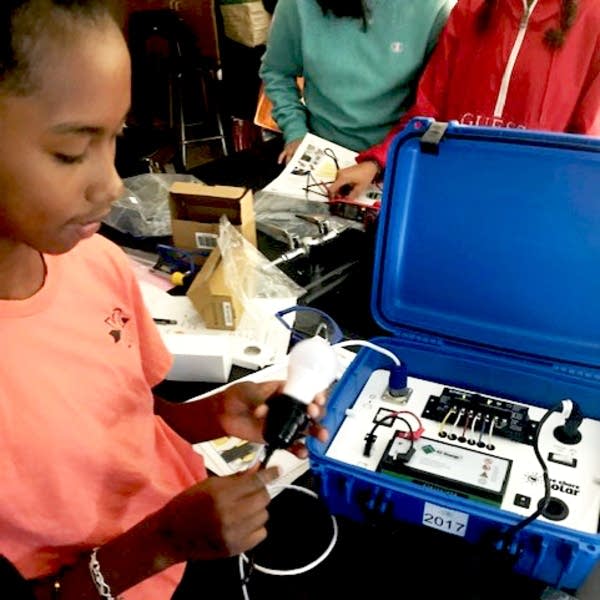Middle school introduces students to climate and energy science with hands-on project
Go Deeper.
Create an account or log in to save stories.
Like this?
Thanks for liking this story! We have added it to a list of your favorite stories.

On a recent Thursday, Katie Small's eighth-grade science class at St. Louis Park Middle School was hard at work. The students were gathered around a series of small blue plastic suitcases, up to their elbows in wires and assembly instructions.
The goal was to put together a series of “solar suitcases" — 12-volt DC standalone solar power systems that will later be shipped to Kenya. There they'll be installed for use at schools in the Kakouma refugee camp. It's a program known as "We Share Solar."
“This is a brand-new exposure for circuits and electricity, learning the difference between AC and DC and even what that means as far as currents go,” Small said. “[We’re] able to dive into electricity in a different way, but with the capstone of renewable and nonrenewable energy.”
Ayelel Meyen’s group was one of the first to successfully use their suitcase to turn on a light bulb: a feat of engineering the eighth grader said wasn’t as hard as she expected.
Turn Up Your Support
MPR News helps you turn down the noise and build shared understanding. Turn up your support for this public resource and keep trusted journalism accessible to all.

"We started learning about AC and DC wiring so we could learn like where to put all the cords and stuff,” Mayan said.
“And then we got our instruction book and just started working on it. It was easier than I thought."
Ayelel's teacher, Small, has been teaching science for 14 years. She said her classroom material has changed a lot in that time to reflect the growing body of research on climate change and changing energy technology.
As her classroom material changes, she said, her students' questions have also changed.
"Every year it's getting more and more concerning about when the world is going to end. That's what students' questions are, ‘Is this going to cause our worlds to end?’” Small said. “Every year I've seen the reaction become stronger and stronger … It's scary."
Small said she started this year's earth and science unit by getting her students to compare the amount of energy they use with the amount of energy their peers in Kenya use. Then they looked at sources of energy and compared solar to other energy choices, looking at the environmental effect of each.
Small’s also working closely with Molly Rosen, who teaches social studies at the school. Rosen is using the solar suitcase project to talk about the history of Africa, colonization, global energy poverty and natural resources.
“It fit perfectly,” Rosen said. “We’ll be looking all over the continent of Africa for different resources and how some areas have more resources than others.”
The most recent state standards on teaching science include specific provisions on teaching climate change and teaching kids that humans are the primary cause of climate change.
Kristen Poppleton, director of programs for Climate Generation, an organization that helps communities work on climate issues, was on the committee to help develop those standards. She said that what’s happening in St. Louis Park is an example of best practice when it comes to teaching climate change.
"We need to be solutions-forward when we teach about it. So, the fact that in that classroom they're teaching about these new technologies, including the solutions piece, is an integral part of teaching about climate change. And teachers need to be doing that," Poppleton said.
Small has found that teaching this subject in this way has been empowering and exciting for her students. They're learning about solar energy and how it can be used in Kenya, but they're also looking at ways they can reduce their own reliance on nonrenewable energy. And they're looking at case studies of school districts that have switched to solar, thinking about what that would mean for their own district.
Small said teaching climate change can be scary for some of her students, but it's also getting some of them excited about the role they might have in making the world a better place.


